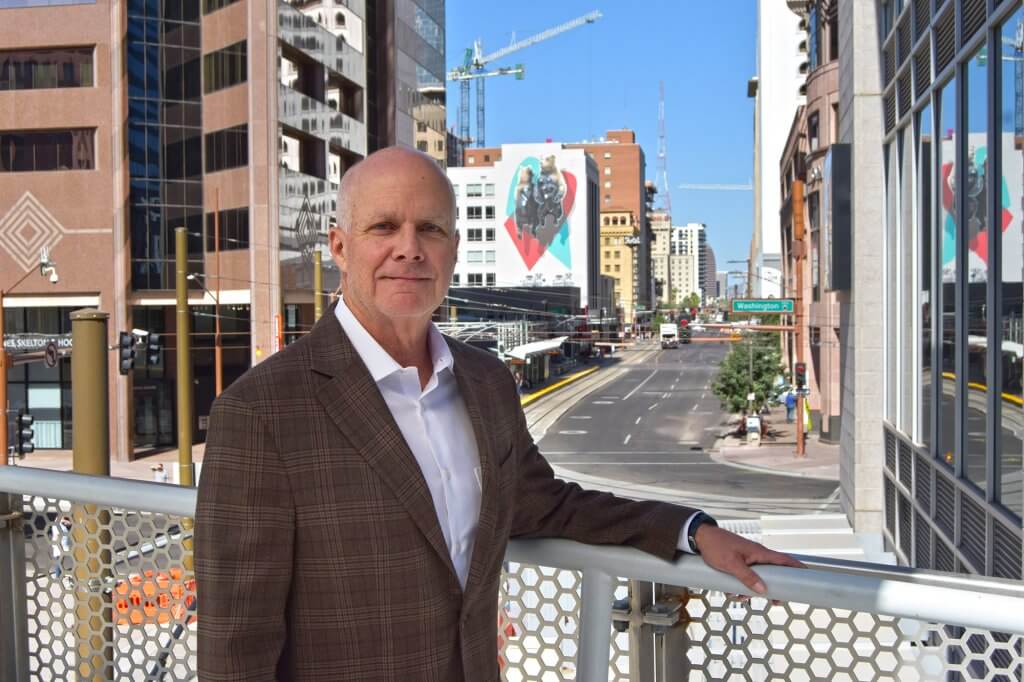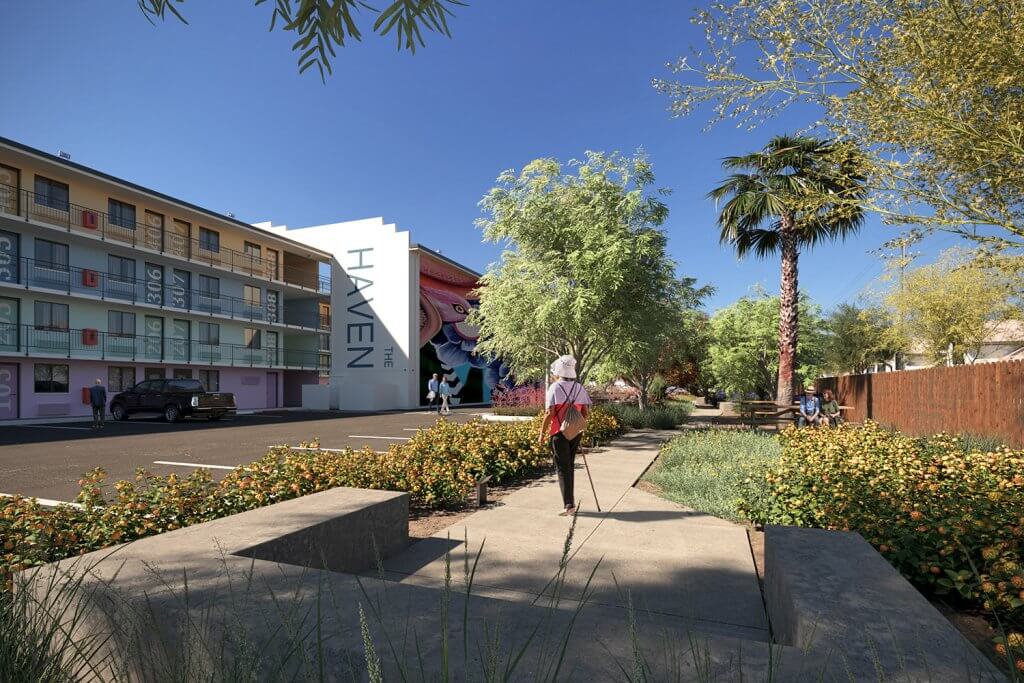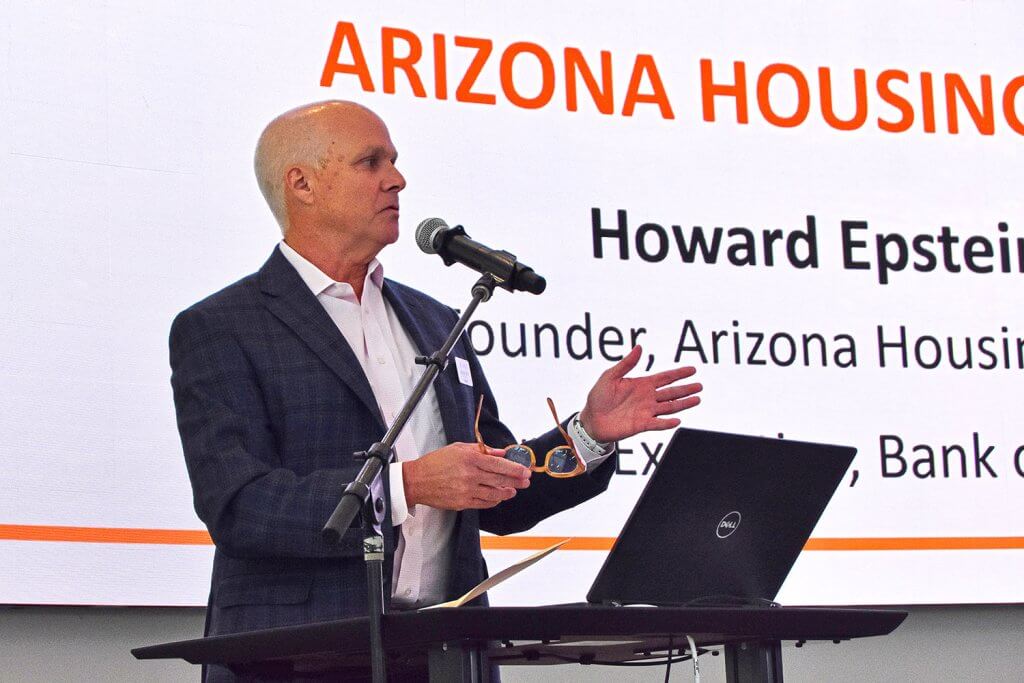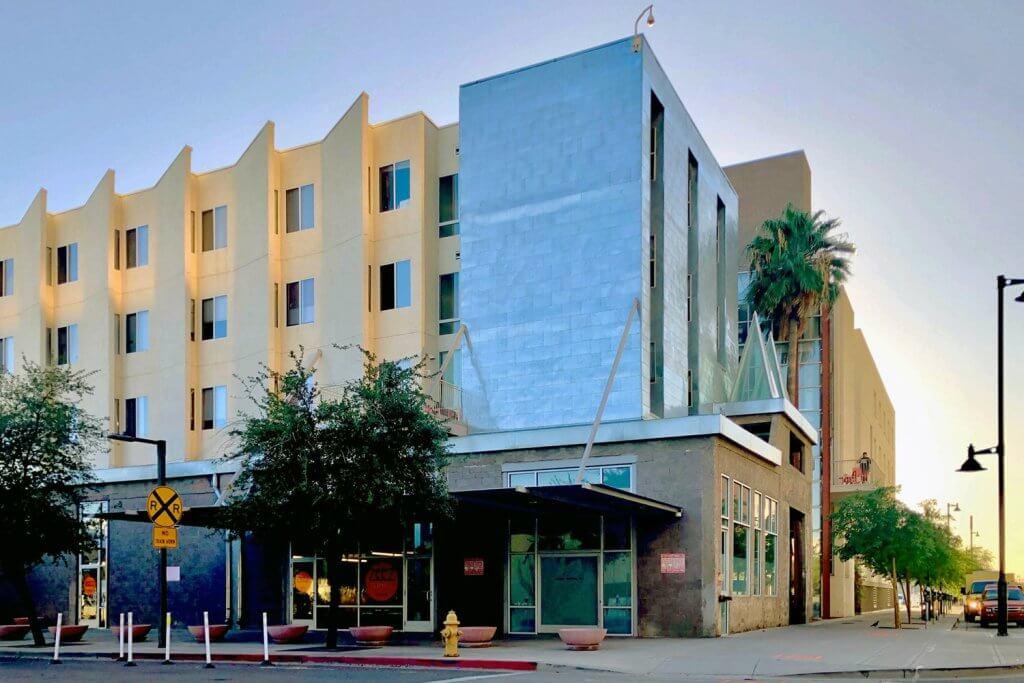Howard Epstein saw a need that he was determined to address. Like other Phoenix Community Alliance Board (PCA) Members, he saw a local housing crisis that couldn’t rehouse people quickly enough.
Epstein quickly rose in stature as Phoenix Community Alliance’s treasurer. For three decades in this position, he oversaw the financial health of the organization and facilitated fundraising with Members on PCA’s key initiatives, from Steele Indian School Park to the Human Services Campus.
What started as a board appointment serving as Bank of America’s representative ultimately ignited his fierce advocacy to provide essential services to those in need.
Within PCA’s walls and resources, he incubated the Arizona Housing Fund (AZHF), which in its final version uses voluntary donations from real estate sales to build permanent affordable housing to meet the state’s growing needs and reduce homelessness. Since 2019, the effort has raised $1.73M from 5,200 donations (and counting) and dispersed approximately $1.3M in grant funding to the nonprofit agencies that build and operate permanent supportive, low-income and working poor housing.
PCA was built on the foundation of industry professionals who all shared the same goal: to use their expertise to benefit the Greater Downtown Phoenix community.

Arizona Housing Fund (AZHF) Founder Howard Epstein pictured outside the Downtown Phoenix, Inc./Phoenix Community Alliance offices. Epstein also served as PCA’s Board Treasure for three decades. (Photo by Taylor Costello)
PCA: What first motivated you to participate in PCA?
Howard Epstein: The old-fashioned way! Kathy Munro had just been named president [of Bank of America in 1994] and was asked to serve on multiple boards, including the Downtown Phoenix Partnership [now the Enhanced Municipal Services District Advisory Board under Downtown Phoenix Inc.]. I was young and considered to be a rising executive. She came to me and said, “I’d like you to be the bank’s representative at Phoenix Community Alliance.” And I quickly said, “Yes, ma’am, happy to do it!” and then asked, “What’s PCA?” And that’s how I started.
PCA: In the late 1990s, you were instrumental in moving local operations from the 101 North building to the new Bank of America Tower at Collier Center. The move brought over 1,000 employees and took up eight floors. How were you involved in making that project a prominent part of our Downtown skyline?
Epstein: At the time, 101 North wasn’t in great shape. It was old and tired. Our President and CEO, Dave Hanna, and Kathy Munro decided they wanted to keep their commitment to staying in Downtown Phoenix by moving into a new building.
We talked to several developers and made a deal with Opus West, who, at the time, was one of the biggest developers in Southwest. I had to get local and corporate approval at the highest levels. The short argument I made was, “We’re going to be moving from a B- building to a brand new A+ building. And we’re going to save about $1,000,000 a year in occupancy expenses because of the inefficiencies of that building, and our name will be at the top [of the new building].”
Our leaders committed to remain part of this Downtown. And if we left, that would send the wrong message. We stayed there for 20 years, which was our lease.
I watched the Downtown grow up with my own eyes. When I started at the bank in 1989, there were three places to go to lunch. I got to see what we became.
PCA: What is the background of the creation of the Arizona Housing Fund?
Epstein: The original idea of what’s now known as the Arizona Housing Fund was that I wanted to pursue a legislative effort to collect $25 from every escrowed transaction in the state to form a special fund with the Arizona Department of Housing, where 70% would go toward new housing and 30% would go to increased shelters to solve the problem.
But anybody who knew anything about our state legislature said that would never pass here. You would need 75% of our state legislature [it takes two-thirds of both Houses to approve or reverse a tax], and nothing gets 75% approval in our state legislature. So I knew I had to take another path.
Fortunately I had friends who said, “Hey, this is too good of an idea. Give up on the legislative piece and make it private, philanthropic, and non-government-related.” I remember being at a lunch with my good friend Steve Hilton, [Executive Chairman, Meritage Homes, which was the pilot company used to collect money for the AZFH], who said, “You’ve got to continue. It’s too good of an idea.”
I remember driving home from lunch and saying, “God, did I just volunteer to run this thing? I don’t think I have time to do this.” Which was right. It is my other full-time job. But I also felt that if I didn’t do this, nobody would have.
The first thing we did once we hit our first million dollars was open ourselves up for grant requests. We are narrowly focused on providing grants to nonprofits specializing in permanent, supportive, low-income and working poor housing projects. And having done these housing projects before, that last piece (of funding) is always the hardest because you get some government money, you get this [separate funding], but then you’re always short. We knew we would be part of that capital.
Not only that, but so many government-funded projects are short because of inflation or the supply chain. When the budget was built 18 months ago, there is a $200,000 or $300,000 shortfall.
That’s the kind of role we’ve been playing in our communities around the state of filling that shortfall.

In 2023, Central Arizona Shelter Services’ (CASS) Senior Haven was one of several project to receive grants from the Arizona Housing Fund (AZHF). The $100,000 grant will help finish the project that consists of 134 units of transitional and emergency housing for senior citizens experiencing homelessness. (Photo courtesy of the Arizona Housing Fund)
If a seller and buyer want to donate, they can request the Arizona Housing Fund Escrow Form within the Arizona Association of Realtors library. All tax-deductible donations are dispersed by the title company in the settlement statement at the close of a sale if someone chooses to donate.
For everyone else, people can donate to the fund through the Arizona Community Foundation website, the AZHF’s partner that disperses the funds through grants to established non-profits to build affordable housing projects.
PCA: What was the extent of the collaboration and ideation with PCA during the creation of the Arizona Housing Fund? There’s a lot of crossover involvement with our Members.
Epstein: PCA has its fingerprints on the Arizona Housing Fund. We have six advisory Committee Members, half of whom are PCA Members: Tim Sprague, [Dr.] Sheila Harris, and myself.
I’ve always viewed PCA as some of the best and brightest in our community, and there was a lot of excellent discussion and brainstorming.
In one of the first sessions, Larry Lazarus challenged me on why just $25. Why not make it $50 or $100? And I said because $25 is so non-offensive, you can’t get upset over it. $100 is real money.
I don’t check our activity every day, but it’s very gratifying to see that almost every day, there will be $25 checks issued by 10 or 12 different title companies. While 95% of our 5,200 donations come from escrow donations, the most significant contributions have come from families, foundations, and others. We’ve had an anonymous gift of $100,000, and we never knew where that came from.
PCA: Phoenix Community Alliance celebrates its 40th anniversary in 2023. How do you envision the upcoming decades of growth for the organization?
Epstein: I hope we continue to bring in young leaders. I get really concerned in the nonprofit world. My kids are 28 and 30 years old. They’re philanthropic and good kids, but the idea of joining a board is the last thing on their list. They don’t think like that. [The Society of the] St. Vincent de Paul does a great job, but everybody who sits on boards looks like me or is retiring, and that’s a problem. There’s a little bit of a leadership vacuum that I hope we’re all able to backfill.
PCA: What other advocacy topics are you passionate about at the moment?
Epstein: I have a lot of friends who are doing all kinds of neat things, and I support them. In our community, I can’t get off the train of basic services for human beings. I get stuck on these things. While I appreciate the love for art museums and the opera, nothing else really matters if you don’t have housing, health care, food, or clothes on your body.

Howard Epstein giving an update of the Arizona Housing Fund at Phoenix Community Alliance’s Annual Member Meeting, pictured Thursday, December 16, 2021. At that point, the fund has accumulated about $800,000 from the benevolence of strangers. (Photo by Taylor Costello)
In 2022, the Arizona Housing Fund began to disperse grants for affordable housing projects throughout Arizona when the fund reached the first million dollars in reserve, resulting from an unexpected $75,000 donation from a small family foundation.
Within almost two years, the results of providing a mechanism to build affordable housing have begun to see lasting real-world impacts. Some of these Arizona Housing Fund-funded projects include Arizona Housing Inc.’s 300-unit conversion of a former hotel into housing at 2900 E. Van Buren Street, Central Arizona Shelter Services’ (CASS) Senior Haven, 134 transitional and emergency housing units, and St. Vincent de Paul’s Ozanam Manor, a transitional shelter with 100 beds for veterans, seniors, and adults with disabilities.
The simple, voluntary effort has taken hold across the state, with cities in Chino Valley, Flagstaff Glendale, and Page using $100,000 or more of grant funding to complete their housing projects.
Epstein hasn’t deviated from the “bold goal” for the Arizona Housing Fund to eventually have $100 million in its coffers since he first brought it up as an idea to PCA five years ago. It’s a quantity he factored from calculating as if all real estate transactions in Arizona were to voluntarily opt-in every year.
It’s an ambitious vision, but he always likens it to the PetSmart Charities Program, which, through a similar collection system, has raised $600 Million for pets in three decades:
“I always come back to that. Why can’t we do that for our own citizens who need help? If they can do it, we can do it.”

In addition to founding the Arizona Housing Fund, Howard Epstein currently serves as the board vice president of Arizona Housing Inc., a local nonprofit that owns and operates 600 affordable housing units in Phoenix, including this one in downtown at 209 W. Jackson St. (Photo by Fara Illich)





